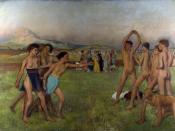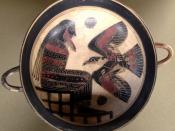The Spartiate was considered a fierce and brutal warrior, excellent in physique, un-yielding in dedication, unmatched in combat, and constantly wiling to die for Sparta. This ideal warrior was created almost forcefully through the "physical, social and moral education" system, the agoge.
Spartan education began soon after birth, where babies were inspected by Ephors and cast onto the slopes of Mt Taygetus if the Spartan health standards were not met. Boys were raised by their mothers until the age of seven, at which point they entered the agoge.
Within the barracks they immediately joined an agelai, or herd of boys. Here they learnt military and basic reading and writing skills. They were taught obedience and how to fend for themselves, share responsibilities and bond with each other. At ten they were taught music, dancing and athletics . These were integral in establishing agility and response and obedience to orders in battle, which were dictated using musical instruments.
Spartans would have sung lyrics like "it is fine to die in the front line" . Along with laconic phrases like "Chilly willy!" or "True manly qualities" these formed an almost propaganda-like method of education that forced Spartan ideas like the nobility of death or the masculinity of rejecting delicacies into the subject's mind.
From twelve to eighteen they learnt games of endurance and skill. They were further disciplined by "cutting their hair short . . . walking barefoot and . . . playing naked" . Their tunics were replaced with a single cloak, which they received each year, and their rations limited. This encouraged theft, which was a display of speed, skill, and stealth. Capture, however, was seen as failure, and severe beatings ensued. We recall the famous tale of a young boy who had stolen a fox cub...


